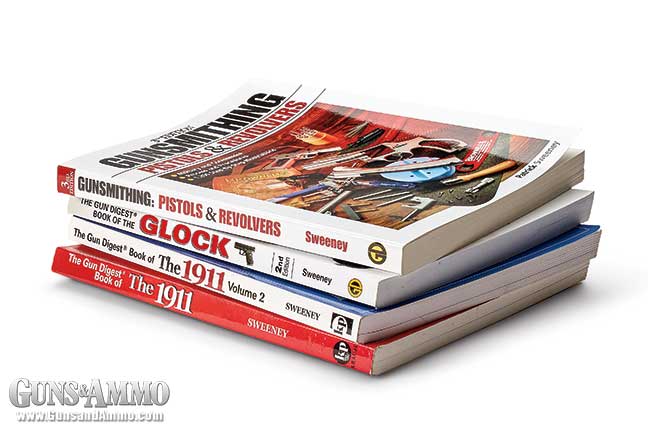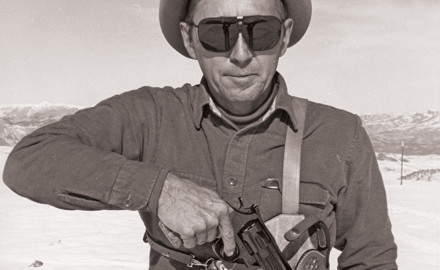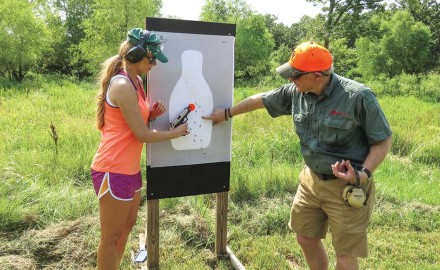How to Be a Gunwriter
If you are going to be a gunwriter, you have to learn to write. Knowing every fact, data point and historical tidbit of every firearm or cartridge won’t do you any good if you can’t make it entertaining to read. When I started meeting other gunwriters, I was surprised at how many had degrees in journalism or English. Being a gunwriter, or planning to be one, does not excuse you from going to college. Before the Eisenhower era, a high school diploma was good enough to get you a well-paying job. Today, lacking a college degree qualifies you to be a surfer dude.
Writing styles vary, and I have to be truthful here. There is a gunwriter or two whose prose I find painful to read. (Heck, you might find my style grating.) Nevertheless, they have devoted readers, and I can find useful info in their efforts. You must find your own style, and this will probably happen with the help of a good editor. If that editor happens to be a teacher in school, you’ll have a leg up on all the other would-be gunwriters who hammer out a style once they start working as an actual gunwriter.
You can get a degree from “J” school, a degree in English, history, the sciences, pretty much any degree that requires writing skills and research experience. A degree in the social sciences won’t be much use here. Tell the editor from whom you are trying to get an assignment that you have a journalism degree, and he’ll likely say, “Cool. Is so-and-so still a professor?” Tell him you have a degree in gender studies, and he’ll probably look at his watch and mutter something about getting back to you when he doesn’t have a meeting he’s late for.
Once you have learned how to write, you also have to learn how to use a camera. We live in a visual age, and your photos can matter as much or more than your words. As one editor who helped me get my foot in the door remarked, “I can take your text and make you Hemingway, or anyone else for that matter, but no one can Photoshop an out-of-focus photo and make it look good.”

“No problem,” you say. “My brother is good with a camera.” Hmm, OK, but is he going to go on that hunt with you into the Rockies that you intend to write about? The guide will have plenty of other things to tend to, including looking after other hunters, and may not have time to take the lead photo for your upcoming feature. While he may offer the hunt free for the exposure, he will probably draw the line at schlepping your brother up the mountain, feeding him and so on just for your photo.
Even if your brother is a good photographer, do you know enough about the subject to tell him what you want in a photo, to coach him into taking the pictures you need? Think of it as a parallel subject to gun knowledge. How will you tell the gunsmith who is making the custom rifle for the Rockies hunt just what you need if you don’t know the hunt, the rifle and the ammo? You have to know enough about photography to describe your needs to others — or do it yourself. So, add knowledge of lighting, exposure, composition and photo-massaging software to the list of skills you’ll have to have.
Back in the film days, a good writer could pass off OK or even marginal photos if his writing was strong or in demand enough. Those days are gone. Photography practice in the digital era costs you only time and battery power. With digital cameras, the instant feedback lets you fine-tune a photo there and then and redo it until it is perfect.
Writing is a solitary profession. Working by yourself, you need discipline. With the “office” right there in your house or apartment and the TV and refrigerator just steps away, there will be distractions. Heck, an Internet search for a tidbit of information can end up, if you aren’t careful, being an hour-long foray into “Hey, that’s cool” serial searching. You have to set aside time, whenever in the day it is most efficient for you, to write and only write. If you already have a job, this may mean waking before dawn or skipping the hot new TV show that night to write.
I have a friend who is a successful author with an impressive body of work. His advice: “Each day, write a thousand words. If you do more, great, but the extra doesn’t come off of the next day’s thousand. The next day, rewrite yesterday’s thousand and add another thousand.”
If you’re a gunwriter, you have to practice writing just as you practice shooting, reloading and all the other things that go into being a gunwriter. Get in that writing practice. “But I don’t have an assignment to write about.” So, make up one. Write up something you know, and do the research. A week later, pick it up, and read it as if you hadn’t written it. Was it useful, entertaining, informative? Were you able to provide the information without depending on jargon, techno-speak and the reader’s prior knowledge? If not, correct it. If it was, you’re on the right track.
One last bit of advice: Don’t write for free. I read “Robert Ringer, Looking Out for Number One” back in 1978. His linchpin of advice: The job isn’t done until you get paid. Sooner or later your landlord wants money, not press clippings from your latest masterpiece. Now go get ’em.
OK, you read every gun article, you watch all the hunting and shooting TV shows, you buy books, and you think to yourself, This gunwriter biz doesn’t sound so bad, or you occasionally pitch it as the less generous statement, I could do that. The question is, how do you get from where you are now to published on the page, with your name, the credit and payment?
The simple answer is: Start paying your dues, right now. There are no gunwriter prodigies. We have found in society that there are people who have a knack for subjects — the 10-year-old classic pianist, the mathematician who does not yet need to shave and so on. Even so, they practiced a lot to get where they are. You learn about guns by reading, shooting, disassembling and cleaning, and hunting or competing in matches. To gain the level of expertise needed takes not just time but practice, effort and a raft of skills.
Read everything: books, magazines, owner’s manuals, military manuals, reloading, gunsmithing, hunting, history. Cast your net wide because you don’t know what you will end up liking or becoming an expert on or what the needs of the industry will be like …Read the Rest
Source:: Guns and Ammo


Leave a Reply